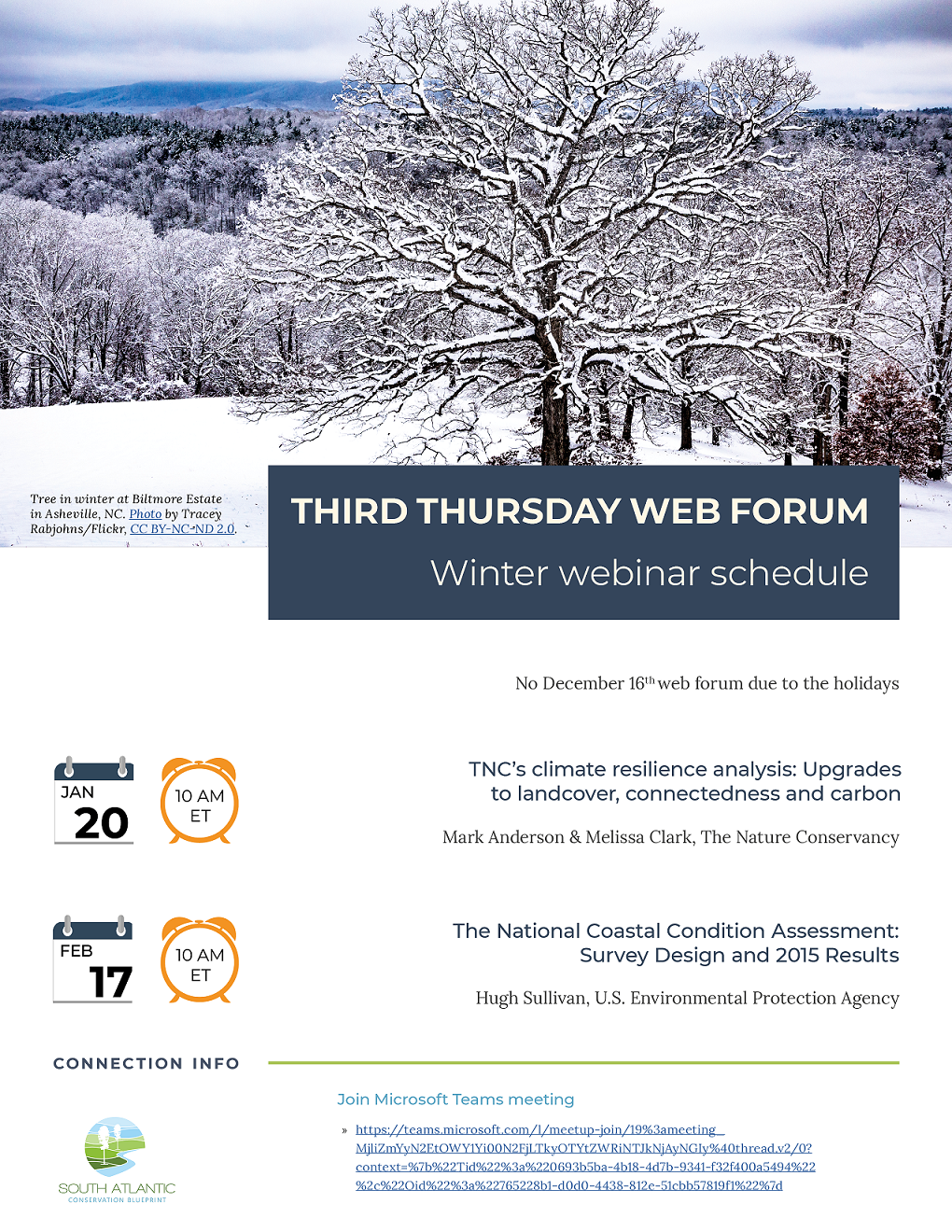Two upcoming webinars on 1/20 and 2/17 - Update to TNC's resilience analysis and latest EPA Coastal Condition Assessment results

The two upcoming webinars in the Third Thursday Web Forum series feature datasets that will be incorporated as indicators in the 2022 Southeast Conservation Blueprint! Don’t forget, you can now see these upcoming webinars and other SECAS events on the new SECAS event calendar.
TNC’s climate resilience analysis: Upgrades to landcover, connectedness and carbon
Mark Anderson & Melissa Clark, The Nature Conservancy
January 20th, 10 am Eastern time
Microsoft Teams meeting (no need to register, just click the link when the time comes): https://teams.microsoft.com/l/meetup-join/19%3ameeting_MjliZmYyN2EtOWY1Yi00N2FjLTkyOTYtZWRiNTJkNjAyNGIy%40thread.v2/0?context=%7b%22Tid%22%3a%220693b5ba-4b18-4d7b-9341-f32f400a5494%22%2c%22Oid%22%3a%22765228b1-d0d0-4438-812e-51cbb57819f1%22%7d
The Nature Conservancy’s climate resilience analysis uses geology, topoclimates, and local connectedness to assess land as to its relative resilience to climate change. While the geology and topography are stable over time, the local connectedness is dynamic and shifts in concert with patterns of development, energy infrastructure, roads, and land cover change. In this webinar, we will review a regionwide upgrade to the local connectedness data completed over the last year. Results highlight changes that have both increased and decreased the resilience of specific places. We will also highlight the new carbon data layers added to the Resilient Land Mapping tool to help conservationists assess the carbon implications of their land conservation and management.
The National Coastal Condition Assessment: Survey design and 2015 results
Hugh Sullivan, U.S. Environmental Protection Agency
February 17th, 10 am Eastern time
The National Coastal Condition Assessment (NCCA) is a collaborative, nationwide, statistically based survey of estuaries and nearshore waters of the Great Lakes, that uses consistent methods to assess ecological indicators of biological, sediment, eutrophication and whole fish contaminant conditions, as well as human health indicators of mercury concentrations in fish fillet tissue, and microcystin and enterococci concentrations in water.
This presentation will give a brief overview of the survey design, including the sample frame, how we work with partners to maintain high quality data, and descriptions of key indicators. In, addition, this presentation will discuss recently published results of the 2015 index period and changes in condition from previous NCCA surveys. It will conclude with a discussion of research indicators for the 2020-21 survey and updates to reporting timelines being implemented for future surveys.
Join Microsoft Teams meeting (no need to register, just click the link when the time comes): https://teams.microsoft.com/l/meetup-join/19%3ameeting_MjliZmYyN2EtOWY1Yi00N2FjLTkyOTYtZWRiNTJkNjAyNGIy%40thread.v2/0?context=%7b%22Tid%22%3a%220693b5ba-4b18-4d7b-9341-f32f400a5494%22%2c%22Oid%22%3a%22765228b1-d0d0-4438-812e-51cbb57819f1%22%7d